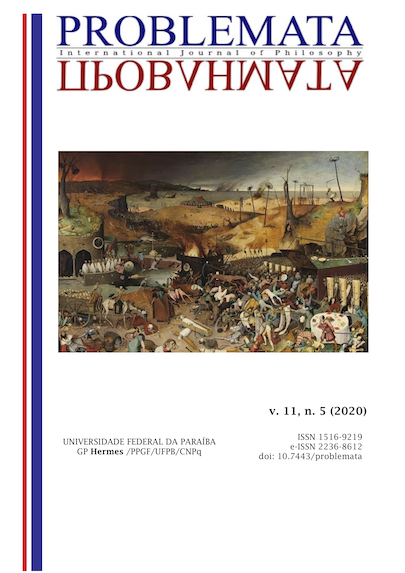CRITICAL AMARTIA SEN OF THE THEORY OF JUSTICE RAWSLIANA
DOI:
https://doi.org/10.7443/problemata.v11i5.56451Keywords:
Formal justice, Concrete justice, Theories of justiceAbstract
The present paper focuses on Amartia Sen and an aspect of his reflection on the Rawslian theory of justice, especially about the justification of substantive and social rights and more particularly those that demand the discussion about the character and nature of the right to private appropriation of social effort. Thus, tehe focuse is understand an aspect of Amartia Sen's reflection exposed in the 3rd chapter of 'Development as freedom', in which Sen contrast the formulation of Rawls' theory of justice, regarding the priority that the author grants the formal element of freedom to the detriment of its materialization and concretization. In the name of those emerges a clear theoretical (and practical) conflict with the demands for the realization of certain rights, resulting in a dichotomy between liberties (as formal, procedural or negative freedoms) vis-a-vis the liberal-individualist tradition and within which they are opposed freedoms (understood in the context of the debate put there as concrete, material or substantive freedoms). So, we have an antinomy will be confronted with the Hart’s 'Essays in Jurisprudence and philosophy', in the sense of pointing out that a problem with Rawls' formulation is that he does not understand it necessary to reconcile the admission of private property as freedom with the general principle of maximum ‘equal freedom’. So want to ask is whether the model proposed by Sen tackles this issue better and more adequately, which implies a hypothetical framework by which, by establishing a small number of basic freedoms, the Rawslian formulation does nothing more than treat property rights as mere formal guarantee of those who have it and to the detriment of all other components of the social body. It is, therefore, as to the method, of research centered on bibliographic review.
Downloads
References
ENGELS, F. Part played by labour in transition from ape to man. In: Marx & Engels Collected works, vol. 25 (Engels). London: Lawrence & Wishart, 2010
FEITOSA, E. Cidadania, Constituição e desenvolvimento: a tensão, no direito, entre promessas formais e as demandas por sua concretização In: Revista Jurídica UNICURITIBA, vol. 4, nº 45, 2016 (A1)
_____. Moralidade, direitos humanos e propriedade privada. In: Problemata – revista |Internacional de Filosofia, UFPB, vol. 9, nº 1, 2018 (B1)
_____. A questão da natureza sob uma perspectiva da filosofia do direito. In: Revista Culturas Jurídicas, Vol. 4, Núm. 8, mai./ago. 2017
HART, H. L. A. Essays on jurisprudence and philosophy. New York: Oxford Univesity Press, 1983
_____. Ensaios sobre teoria do direito e filosofia. Rio de Janeiro: Elsevier, 2010
MARX, Karl. Escritos de juventud. México: FCE, 1987
_____. The nationalisation of the land. In: Marx and Engels Collected Works. London: Lawrence & Wishart, 2010, p. 131ss, vol. 23
RAWLS, John. El liberalismo político. Madrid: Crítica, 1993.
_____. Uma teoria da justiça. São Paulo: Martins Fontes, 1977
_____. A Theory of Justice. Cambridge (Massachusetts): Harvard University Press, 1999.
_____. O liberalismo político. São Paulo: Ática, 2000.
__________. Kantian Constructivism in Moral Theory. In.: FREEMAN, S. (org.) John Rawls – Collected Papers. Cambridge (Massachusetts): Harvard University Press, 2001, p. 303-358.
SEN, Amartia. Desenvolvimento como liberdade. São Paulo: Companhia das Letras: 2010.
Downloads
Published
Issue
Section
License
Authors who publish with this journal agree to the following terms:
- Authors retain copyright and grant the journal right of first publication with the work simultaneously licensed under a Creative Commons Attribution License that allows others to share the work with an acknowledgement of the work's authorship and initial publication in this journal.
- Authors are able to enter into separate, additional contractual arrangements for the non-exclusive distribution of the journal's published version of the work (e.g., post it to an institutional repository or publish it in a book), with an acknowledgement of its initial publication in this journal.
-
- Authors are permitted and encouraged to post their work online (e.g., in institutional repositories or on their website) prior to and during the submission process, as it can lead to productive exchanges, as well as earlier and greater citation of published work (See The Effect of Open Access).





